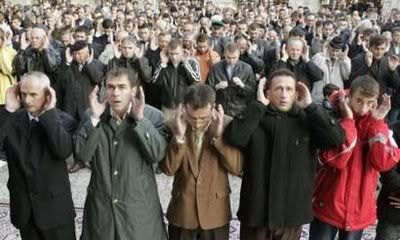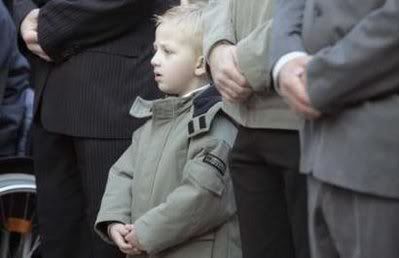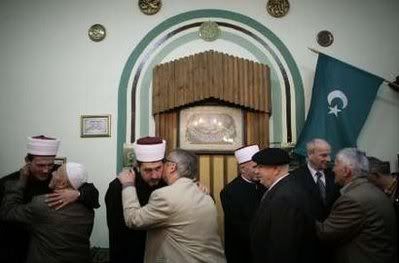 SARAJEVO, Bosnia (October 1,2008) - Bosnia marked the first day of the Muslim holiday of Eid Ul-Fitr (Bosnian: Ramazanski Bajram) yesterday with Bosnian leaders calling for unity among all Muslim nations.The central ceremony in Bosnia was held in the Gazi Husrev Beg’s Mosque in the Bosnian capital Sarajevo. The leader of the Bosnian Islamic Community Reisu-l-ulema Mustafa Ef. Cerić led the prayers and delivered two sermons afterwards.
SARAJEVO, Bosnia (October 1,2008) - Bosnia marked the first day of the Muslim holiday of Eid Ul-Fitr (Bosnian: Ramazanski Bajram) yesterday with Bosnian leaders calling for unity among all Muslim nations.The central ceremony in Bosnia was held in the Gazi Husrev Beg’s Mosque in the Bosnian capital Sarajevo. The leader of the Bosnian Islamic Community Reisu-l-ulema Mustafa Ef. Cerić led the prayers and delivered two sermons afterwards.He called on all Muslims in Europe and the rest of the world to unify their ranks.He also urged the rich Muslims to give a hand to the poor people in any part of the world to alleviate their suffering.
Reisu-l-ulema Mustafa Ef. Cerić also called yesterday for better cooperation between all Bosnian citizens.
“It’s not hard to find reasons for conflicts, but it takes wisdom to find reasons for cooperation,” he said in an interview with the Bosnian daily Dnevni Avaz.
The Muslim communities in Albania, Kosovo, Sandžak,Croatia,Macedonia Slovenia and Montenegro also held festivities to mark the end of the holy fasting month of Ramadan.

Bosnian Muslims pray outside Begova mosque in the Bosnian capital Sarajevo as they welcome the Eid Ul-Fitr holiday, which marks the end of the holy fasting month of Ramadan, September 30,2008.

A Bosnian boy prays with other Muslims outside Begova mosque in the Bosnian capital Sarajevo as they welcome the Eid ul-Fitr holiday, which marks the end of the holy fasting month of Ramadan, September 30,2008.

Bosnian Muslims greet one another after morning prayers in the northern Bosnian city of Banja Luka, on the first day of Eid ul-Fitr to mark the end of the holy fasting month of Ramadan, September 30, 2008. Muslims of Banja Luka gathered for prayers in a building next to the Ferhadija mosque which was destroyed during the 1992-1995 Serbian aggression against Bosnia.
Eid ul-Fitr or Id-Ul-Fitr, often abbreviated as simply Eid, is a Muslim holiday that marks the end of Ramadan, the month of fasting. Eid is an Arabic term meaning "festivity" or "celebration" while Fitr means "to break the fast" and can also mean "nature" from the word "fitrah" and therefore symbolizes the breaking of the fasting period.
On the day of the celebration, a typical Muslim family is awake very early and then after praying the first normal everyday prayer, is required to eat in a small quantity, symbolizing the end of Ramadan.
Muslims then attend special congregational prayers held only for this occasion in mosques, in large open areas, stadiums or arenas. The prayer is generally short, and is followed by a sermon (khutba). Muslims greet and embrace each other in a spirit of peace and love after the congregational prayer.
After the special prayers, festivities and merriment are commonly observed with visits to the homes of relatives and friends to thank God for all blessings. The 2007 Eid ul-Fitr took place, for some on Friday, October 12th and others Saturday, October 13th.
For Muslims, Eid ul-Fitr is a joyous occasion with important religious significance, celebrating of the achievement of enhanced piety. It is a day of forgiveness, moral victory, peace of congregation, fellowship, brotherhood and unity.
Muslims celebrate not only the end of all that fasting but also thank God for the help and strength that they believe he gave them throughout the previous month to help everyone practice self-control. It is a time of giving and sharing, and many Muslims dress in holiday attire.
Eid Ul-Fitr is celebrated on the first day of Shaw'waal, at the completion of Ramadan. Shaw'waal is the 10th month of the Islamic calendar. The Eid-al-Fitr is a very joyous day; it is a true Thanksgiving Day for the believing men and women. On this day Muslims show their real joy for the health, strength and the opportunities of life, which Allah has given to them to fulfill their obligation of fasting and other good deeds during the blessed month of Ramadan.
.






